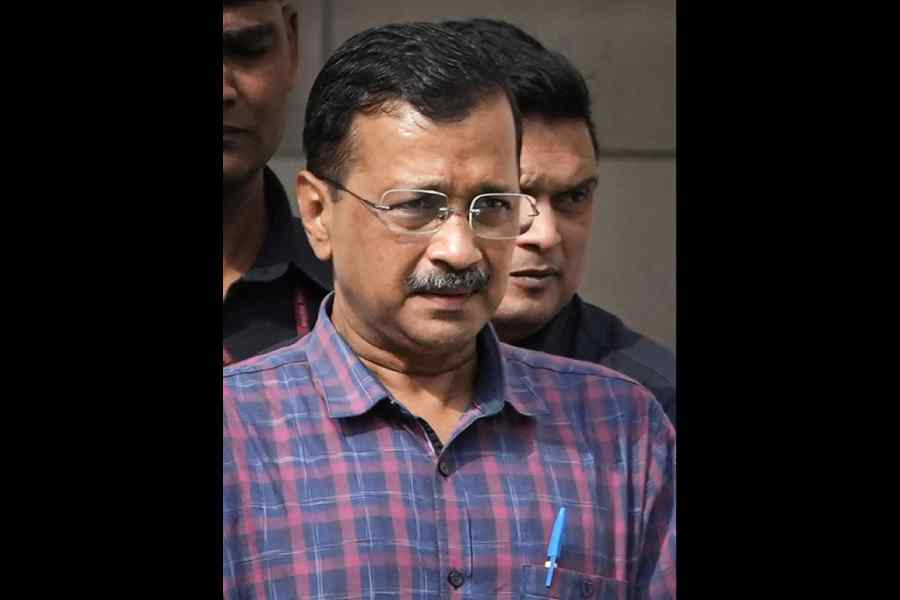Upholding the arrest of Chief Minister Arvind Kejriwal in the corruption case related to the alleged excise policy scam, the Delhi High Court on Monday said there was no malice in the acts of the Central Bureau of Investigation (CBI) which demonstrated how the AAP supremo could influence witnesses who could muster the courage to depose only after his arrest.
The high court noted that the loop of evidence against Kejriwal got closed after collection of relevant evidence following his arrest by the CBI and it cannot be said that it was without any justifiable reason or illegal.
The court said Kejriwal is not an ordinary citizen but a distinguished recipient of the Magsaysay Award and the convenor of the Aam Aadmi Party.
“The control and the influence which he has on the witnesses is prima facie borne out from the fact that these witnesses could muster the courage to be a witness only after the arrest of the petitioner, as highlighted by the special prosecutor.
"Also, it establishes that the loop of evidence against the petitioner got closed after collection of relevant evidence after his arrest. No malice whatsoever, can be gathered from the acts of the respondent (CBI),” Justice Neena Bansal Krishna said in a 48-page judgment.
The high court dismissed Kejriwal’s plea challenging his arrest, saying it was only after sufficient evidence was collected and sanction was obtained in April, 2024 that the agency proceeded with further probe against him.
It noted that the links to the crime extended even to Punjab but material witnesses were not coming forward due to the influence exercised by Kejriwal by virtue of his position. It was only after he got arrested that the witnesses came forward to record their statements, the judge said.
“It is a bounden duty of every court, more so the courts of first instance, to ensure that the extraordinary powers of arrest and remand are not misused or are resorted to by the police in a casual and cavalier manner,” the high court observed.
Kejriwal’s counsel had argued that the FIR was lodged by the CBI in August 2022 and the probe was carried out for the last two years. There was no new evidence or ground in the arrest memo which could justify his arrest in June this year, he had said.
The court said the CBI has explained that respecting his position as the Chief Minister of Delhi, police treaded with "trepidation and caution" and proceeded to collect the evidence from other suspected accused.
“Consequently, extensive investigations were carried out across India to ascertain the entire web of conspiracy involving numerous persons. The investigating agency has further explained that it is only after sufficient material was collected against the petitioner over a period of one and a half years that they sought the sanction for prosecution of the petitioner, which was granted on April 23, 2024.
“The reasons for not proceeding immediately against the petitioner, after registration of the FIR is thus, well explained by the CBI and does not reek of malice,” it said, adding, the argument that there existed no occasion to arrest him was not tenable.
It termed as “fallacious” the argument of Kejriwal’s counsel that no permission was warranted or required from the trial court for interrogating the accused in jail as he was already in judicial custody in the money laundering case registered by the Enforcement Directorate (ED).
The court said an application had to be moved by the CBI since Kejriwal was detained in judicial custody in the Prevention of Money Laundering (PMLA) case, and CBI officials would not have been permitted to examine him without the requisite permission of the court.
The high court noted it was stated by the CBI that Kejriwal's custodial interrogation was needed to confront him with evidence to unearth the larger conspiracy hatched amongst the accused/ suspects regarding the formulation and implementation of the excise policy and to establish the trail of the ill-gotten money.
His custodial interrogation was also required to establish the role of other suspect persons including public servants and to unearth the facts which were in his exclusive knowledge, it noted.
The high court noted that the CBI, in its application before the trial court, had stated that during his interrogation in jail, Kejriwal remained evasive and non-cooperative which hampered collection of relevant evidence.
It said the investigating officer of the case was the master of all the investigations and he should not be prohibited from conducting the probe and the courts must step in only when there appears to be an abuse of power or arbitrary exercise of procedures, especially the power of arrest.
Kejriwal was arrested by the CBI on June 26 from Tihar Jail, where he was lodged in judicial custody in a connected money laundering case filed by the ED.
The chief minister, who was arrested by the ED on March 21, was granted bail by the trial court in the money laundering case on June 20. However, the trial court's order was stayed by the high court.
On July 12, the Supreme Court granted him interim bail in the money laundering case.
The excise policy was scrapped in 2022 after the Delhi lieutenant governor ordered a CBI probe into alleged irregularities and corruption involving the formulation and execution of the excise policy.
According to the CBI and the ED, irregularities were committed while modifying the excise policy and undue favours extended to licence holders.
Except for the headline, this story has not been edited by The Telegraph Online staff and has been published from a syndicated feed.











